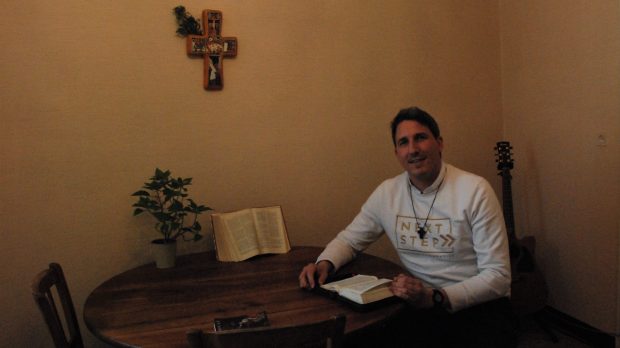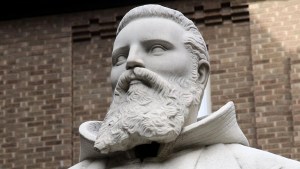Fr. Olivier de Gersigny is from the island nation of Mauritius, an archipelago in the Indian Ocean with inhabitants of various origins, notably Indian and African. A descendant of French settlers, the priest, a member of the Chemin Neufcommunity, grew up in a well-to-do milieu, in a multicultural community. In the course of a radical conversion, he gained a new perspective on the racial prejudices present on his island. Today, as a vicar in Angers, in western France, he believes that the Lord can free us from divisions.
On a Sunday at the parish of St. John Paul II in Angers, the bells are ringing at the end of Mass. Families from Angers, Christians from other cultures, people who have come alone: In the square in front of the church, Father Olivier de Gersigny catches up with each of them.
“I’m attentive to forming relationships with everyone,” explains the 30-year-old priest, who looks like a rugby player, with a slight island accent. Concern for universal brotherhood is a key concern of his.
He has now been the parochial vicar at the parish of Anjou for a year. He was raised surrounded by friendships and scouting. Every Sunday, he attended Mass to the rhythm of the sega—traditional Mauritian music and dance.
“It was very crowded. In Mauritius, the church is the place where people come together,” the priest said. He remains very impressed by the visible divisions, because on the island, “poor neighborhoods are next to the big houses of well-to-do families.” This multicultural reality was the fertile ground in which his mission would take root.
Leaving a comfortable life
Everything became clear to him one evening, at the age of 18. Having arrived in France to study, the Mauritian wondered about the meaning of his existence, which he wanted to be “broader” than the “little bubble” of his comfortable Mauritian life.
He turned to God. “The Lord filled me with his love. This spiritual experience, which lasted a few minutes, made me understand how much He loves me. I said to him, ‘My life belongs to you; I want to live this love.'”
Fr. de Gersigny went to the seminary in France. He received the Sacrament of Holy Orders in 2017.
This luminous event, followed by two decisive encounters with brothers in his community, opened his eyes to the racial and social prejudices of Mauritius. One of these was his visit to the country after his ordination. Family and friends were gathered for a reception. Among them, he had invited some Creole friends.
“Only one came. He was alone among the majority of whites, while the other people of color who were present were on the service staff. He didn’t stay,” says Fr. de Gersigny with regret. His parents then met these friends and “broke the bubble of separation.”
Having encounters with each other in truth is essential to “breaking down cultural barriers” which have remained in place since the days of slavery. However, it’s not easy without the help of the Lord! “God helps us to see a brother in someone who is different, because we’re all created by Him, who loves us,” confides the priest. In his eyes, Christ has “opened a path of liberation” for him.
Liberation and forgiveness
“This pushed me towards reconciliation and dialogue in truth,” Father Olivier says. He draws strength from his community, which is very supportive.
“The strong point of Chemin Neuf is the unity of Christians and of peoples, which passes through reconciliation and forgiveness.” In Mauritius, discussion groups of different communities are being set up. Led by a Christian sociologist, they address the issues of indifference and racism.
Today, Fr. de Gersigny tries to live fraternity at every opportunity, as with the two families he recently prepared for baptism. One was an African family and one was a European family. He tried to “put everyone at ease.”
There is also a Hispanic parishioner, who is sometimes left out when families gather in the square. “I’ll talk to her, but at the same time I say to myself, ‘Be careful, you have to talk to everyone,'” says Fr. Olivier.
He sometimes regrets not having been attentive enough to his Mauritian brothers and sisters when he was young. “But I am at peace. Today mercy has taken over, and the Lord has transformed me.”


